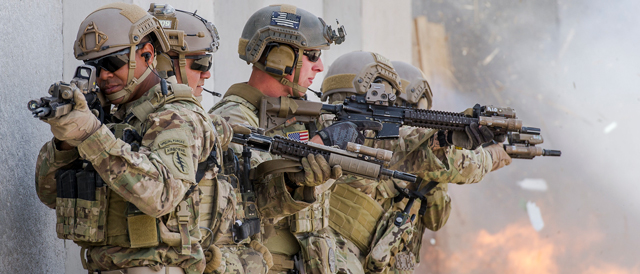
CIWAG Irregular Warfare Studies
The Irregular Warfare Studies (IWS) are a collection of case studies that examine the use of irregular warfare strategies by states and nonstate actors to achieve political goals. These cases address a wide variety of irregular challenges on the spectrum of political violence and competition that encompass current-day or historic armed groups and conflicts, as well as the use of other irregular strategies and means to achieve political goals, including gray-zone activities, economic coercion, information operations, and resource competition.
CIWAG's aim is to make these cutting-edge research studies available to various professional curricula that assist professionals preparing to meet the complex challenges of the post-9/11 world, while aiding the work of operators, practitioners, and scholars of irregular warfare.
-

Wildlife Trafficking and Poaching: Contemporary Context and Dynamics for Security Cooperation and Military Assistance
Christopher Jasparro
Wildlife Trafficking and Poaching: Contemporary Context and Dynamics for Security Cooperation and Military Assistance, by Dr. Christopher Jasparro, examines the impact wildlife crime has played on exacerbating the delicate security situation in Africa, and the effectiveness of the security cooperation and assistance programs that have formed as a result. Wildlife crime has become a significant international security issue as poaching is used to fund terrorism, drug trades, and other illicit activities that destabilize local African governments and endanger vulnerable species. Wildlife crime is complex and varied with no individual solution. To combat this growing issue, plans and programs carefully crafted to address the context of each unique threat and the strategic environment is required to prevent creating unintended negative consequences.
-

Defeating ISIS and Al-Qaeda on the Ideological Battlefield: The Case for the Corporation Against Ideological Violence
Michael W.S. Ryan
Defeating ISIS and Al-Qaeda on the Ideological Battlefield: The Case for the Corporation Against Ideological Violence, by Dr. Michael W.S. Ryan, explores the radicalization process and the strategies employed by ISIS and al-Qaeda to recruit jihadists. In order to more effectively combat violent extremism and adversarial propaganda, a new federal agency with dedicated resources in the form of a public-private corporation should be created with the primary goal of subduing violent ideologies and countering the spread of violent extremism.
-

Totalitarian Insurgency: Evaluating the Islamic State’s In-Theater Propaganda Operations
Charlie Winter
Totalitarian Insurgency: Evaluating the Islamic State’s In-Theater Propaganda Operations by Charlie Winter examines the in-theater propaganda strategies of the Islamic State in Iraq and al-Sham (ISIS). Although much attention has rightly been paid to their online recruiting and social media campaigns, their in-theater strategies are equally compelling and strategically targeted. As ISIS and al-Qaeda continue to inspire and sponsor new franchises around the globe, the issue of how to control access to counter-narratives becomes more urgent; this first look at in-theater strategies provides the basis for further research and investigation into the in-theater and online competition for ideas and influence around the world.
-

The Al-Qaeda Accelerant in Boko Haram’s Rise
Jacob Zenn
(IWS/01 - Irregular Warfare Studies, book 1)
Using primary source materials, Jacob Zenn’s case study, The Al-Qaeda Accelerant in Boko Haram’s Rise, maps the group’s many factions, loyalties, splinterings, and re-formations. Zenn supplies deep insight into the seams and gaps that exist, and how strategic and tactical motivations have propelled an armed group to regional importance. He also dissects how the group’s evolution has taken place under the watchful eye, and often directing hand, of both al-Qaeda and the Islamic State in Iraq and al-Sham and highlights its starring role in a new international rivalry: the uncivil war between al-Qaeda and the Islamic State.
-

El Salvador in the 1980s: War by Other Means
Donald R. Hamilton
The civil war in El Salvador in the 1980s engaged a remarkable degree of attention at the highest levels of the U.S. government and became a proxy of the Cold War. El Salvador in the 1980s: War by Other Means, by Donald R. Hamilton, brings to light the challenges of committing oneself to a flawed ally and intervening in another country with an exceptionally limited number of military personnel.
-

ISIS: The Terrorist Group That Would Be a State
Michael W.S. Ryan
(IWS/02 - Irregular Warfare Studies, book 2)
This case study presents a historical net assessment of ISIS, and its strengths and weaknesses at its zenith. Its military and policy recommendations for degrading ISIS are useful conclusions for confronting similar ideological territorial based groups in the future. This case study represents historical research current as of August 2015.
-

Sovereign Wealth Funds as Tools of National Strategy: Singapore’s Approach
Devadas Krishmadas
Across the globe - from the port of New Jersey to the copper mines in trans-Sahel Africa - governments are wrestling with the issue of foreign financial influence and national security. This becomes even more acute in states that are trying to transition from conflict to stability: When should states allow or encourage other countries to invest in them, and what industries should they allow foreign companies to own or build? Should states allow foreign investment funds to build infrastructure, extract rare minerals, and operate ports? How does this support or undermine the legitimacy and authority of the state? Successful IW practitioners need to understand and be able to account for third-party influence in its many varieties.
-

Revolutionary Risks: Cyber Technology and Threats in the 2011 Libyan Revolution
John Scott-Railton
(IWS/03 - Irregular Warfare Studies, book 3)
The 2011 Libyan revolution was marked by the intensive use of cyber technology. Using decentralized ways of connecting, such as two-way satellite Internet, the Libyan opposition almost completely bypassed the government's sophisticated Internet monitoring equipment and effectively ended the ability of the Gaddafi regime to control Internet access. Still, electronic actors working on behalf of the regime attacked opposition computers by exploiting key human vulnerabilities.
-

Taliban Networks in Afghanistan
Antonio Giustozzi
Dr. Antonio Giustozzi relies on his extensive experience as a researcher in Afghanistan to create an insightful analysis of a wide range of topics including assessments of the Taliban’s strengths and weaknesses, their ability to reassess and adapt, and their operational and strategic successes and failures. He has presented a balanced treatment of the subject matter; however, balance does not mean that the case study will be uncontroversial. In fact, Giustozzi’s analysis contains some rather blunt appraisals of many of the major actors in this conflict; including both ISAF and the Taliban.
-

Varieties of Insurgency and Counterinsurgency in Iraq, 2003–2009
Jon Lindsay and Roger Petersen
Varieties of Insurgency and Counterinsurgency in Iraq, 2003-2009 offers a useful analytical framework for understanding how and why rebellions either grow or diminish. This case study was created to focus on two specific challenges that operators and practitioners faced in Iraq: how to understand the actors and the complex irregular warfare environment; and how to manage interaction, adaptation, and reassessment in irregular warfare.
-

Organizational Learning and the Marine Corps: The Counterinsurgency Campaign in Iraq
Richard H. Shultz Jr
Organizational Learning and the Marine Corps: The Counterinsurgency Campaign in Iraq examines how the U.S. Marine Corps was able to learn from and adapt to conditions on the ground in Anbar province from 2006–2008 and develop a three-dimensional strategy that resulted in stability. Dr. Richard Shultz views this success through the lens of organizational theory, arguing that the Marine Corps’ organizational culture underscores learning and embeds lessons from its history into the Corps memory.
-

Reading the Tea Leaves: Proto-Insurgency in Honduras
John D. Waghelstein
(IWS/04 - Irregular Warfare Studies, book 4)
This case is about an insurgency that apparently had all the essentials for success but never transitioned beyond Phase One, the proto-insurgency phase. According to Daniel Byman, the success or failure of a proto-insurgency depends in large part on the reaction of the state. This case examines a wide range of issues that worked against the Honduran governments success at extirpating the insurgency, including institutional indifference and preoccupation with external threats on the part of the Honduran Army, bureaucratic inertia on the part of the American in- country entities, and turf sensitivity by U.S. intelligence. In spite of these obstacles, the Government of Honduras (GOH) eventually neutralized the insurgent threat. The prevailing question is: How was this threat recognized?

